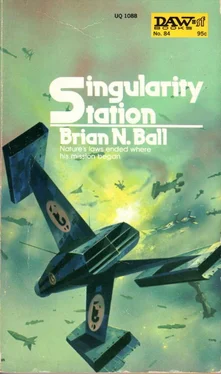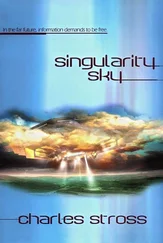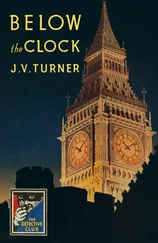How could he convince the machines otherwise? If he were to go closer, he needed the massive resources of the station’s robots. He needed the robots and their instant technology. Warning impulses roared through the nerve-endings of his palms. He ignored them, mesmerized by the sight of the Altair Star. He had to get aboard that ill-fated vessel!
“Commander Buchanan!” the robotic controller called. “High field momentum from the Singularity core!
Action necessary!”
Buchanan still watched, and it was only when the frosted, glittering Altair Star began to disappear behind strangely alive coils of imponderable forces that he shook himself free of his ghost-ship’s spell.
“Well?” he asked.
“Commander Buchanan, core emissions indicate maximum danger.” The station juddered as its screens adapted themselves to the huge energies flowing from the bizarre center of the Singularity. Buchanan saw the screen shiver and dissolve. The scanners roved the Singularity.
Then Buchanan lost interest in the Altair Star, for a probing scanner ranged deep into the central core. He saw into the very womb of Singularity, the hole that gave birth to the wild, incomprehensible and deadly monster that dominated the Quadrant.
“The hole,” whispered Buchanan.
Seemingly empty, black, formless, and yet having properties of shape, it was a gap that held neither time nor space.
“Go!” Buchanan called, suddenly more afraid than he had been for three years. “Go!”
“Starquake,” commented the robotic controller. “Commander Buchanan—starquake! The station is in danger, sir!”
Still awed, Buchanan punched orders into the console.
The station’s three storehouses of energy screamed with effort. Roaring, pulsing, blasting, they countered the ferocious unguessable emissions from the black hole. Yet Buchanan still watched that uncanny gap in the cosmos, even as the station began to slide away from the seismic disturbances. He held the scanner locked onto the eerie black hole until the station abruptly bit with great fangs into the serpentine coils that embraced it.
Slowly the station heaved itself away from the furious storms of the inner depths. It clawed out and away from the frightful emissions.
Buchanan could still see that terrible emptiness long after the scanner was unable to range on it. The black hole had imprinted itself on his mind; it was an afterimage on the retina, one that would not leave him.
There was a cosmic mystery here: Buchanan was almost stupefied by the otherness of what he had seen. The black hole belonged to no part of the Galaxy.
It was the ultimate mystery, the ultimate danger. Buchanan felt drained, spent, utterly fatigued. Some hours passed before he could concentrate on his self-imposed task. Buchanan slowly recovered. There was no slackening of his resolve. Starquake had not dismayed him. The eerie black hole had left him shocked but not overwhelmed. The strange graveyard was terrifying, but he could face it. Buchanan looked at the robot’s cone-shaped pedestal.
Somehow he had to convince the machines that what he had seen was possible. That the huge Sargasso Sea and its wrecks were not beyond reach.
There was one source of comfort. The station had proved itself. Even the frightfulness of starquake could not dent its shields. They had held, just as the engineers promised. But God help any ship that came near the Singularity now!
“Enforcement Service cruiser ranging. Course altering. Super-Phase engaged,” reported a scanner. They would have picked up Rosario, thought Liz Deffant. She sat quite still in the comfortable, deep seat as Maran soothed the disturbed high-grade machines. She had expected pain and terror, grotesque threats, Maran’s fury. And nothing had happened. Her reaction had been predictable, she recognized: resignation and a state of complete supineness. Not only did she feel that she could no longer interfere in the take-over of the ES 110: if there had been a practicable way of upsetting Maran’s schemes, she could not have brought herself to consider it. She was drained of nervous energy. Shock, her mind said again. You’re in shock. The shock of Maran’s totally unexpected treatment. He was a murderer, yet he had a strange dignity. He was a warped personality, yet he could talk sanely to her about her work with the New Settlements Bureau though three cruisers were ranging on the ES 110.
“You’re with the exploration teams, Miss Deffant,” he had said encouragingly. “I expect you know the planet where it was intended to send me?”
“Not that one. Not personally. I know of it.”
She had been able to answer in the same calm way. And what a conversation it had been. Herself, scared witless and only now able to control the shaking of her limbs; Maran, almost elegantly directing the machines that had once controlled the ES 110. Here she was on the bridge with a huge, black-clad man who regarded her with compassion and admiration. Maran the murderer. Maran whose bizarre machines had ripped out the minds of so many deluded men and women.
“I believe it’s an inhospitable planet,” he was saying, talking as if she were a respected colleague, discussing the planet at the Rim where this batch of expellees would have been ejected.
“It was tolerable,” she said. “A rather severe range of temperatures. But there were excellent indigenous building materials. There was a problem with carnivores—” She stopped. She was replying to him as if he were not the murderer of the guard and poor dead Tup. Maran saw her hesitate.
“Hence the primitive ballistic missile-projectors in the pods,” he prompted. “Resourceful thinking, Miss Deffant.”
“You killed them!” Liz burst out, unable to sustain the role Maran was offering her.
“Regrettably, yes.” Maran turned to the console and fed in commands. He turned back to look at her.
“But for you,” he said slowly, “I could turn this ship toward my own planet. Maran could begin again. Everything is ready.” Liz flinched as she saw the muscle straining in his neck. He was flabby, but the muscle was there. “Now, Maran must run.”
“I’m glad!”
“Naturally, Miss Deffant. But you must agree that you have caused me considerable harm.”
“Message beamed from Enforcement Service cruiser,” interrupted the Grade One robot. “Commander Lientand requests direct visual and sound contact with crew-members. Failing that, sir, he requests similar contact with you.”
“You can’t possibly get away,” Liz said quietly. “Not three cruisers—it just can’t be done. Talk to them. They’ll try to understand.”
It took all the strength she could summon up, this plea to Maran. She was fascinated by his impassive gaze. He was looking past her now, to the big operations screen which showed a shadowy representation of the gray-black form of the cruiser. The blue-pulsing screen was the center of all his thoughts. It seemed that he was willing some new contingency to arise. Liz had the feeling that, if he stared hard enough at the operations screen, some avenue of escape would open in the blank reaches between the arms of the Galaxy.
“Three cruisers now on converging course,” reported another scanner.
“There’s nowhere to go,” Liz said, more softly still.
“We leave a wake like a comet’s tail,” said Maran. His big white hands flickered over the console. Liz saw the cosmos pinwheel on the big blue operations screen.
The entire Quadrant lay before her. Another, sensitive motion of Maran’s hands brought the coruscating wakes of three cruisers into brilliant focus. “The cruisers,” said Maran, and the long black snouts had the look of night creatures. “I wonder if they know you are aboard?”
Читать дальше












